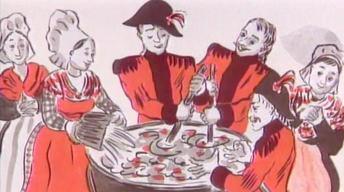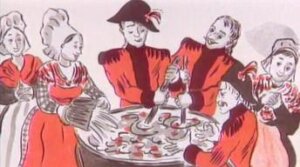
Stone Soup
 About 15 years ago, when I finished my term as senior warden at All Saints’ Atlanta, the rector, my friend Geoffrey Hoare, asked me to dream and build a leadership development program at the church, both to prepare future lay leaders for vestry service and to create an opportunity for active leaders to get to know one another, and their church, better.
About 15 years ago, when I finished my term as senior warden at All Saints’ Atlanta, the rector, my friend Geoffrey Hoare, asked me to dream and build a leadership development program at the church, both to prepare future lay leaders for vestry service and to create an opportunity for active leaders to get to know one another, and their church, better.
With my typical ideological/theological focus on aspirational naming, I called it the Talents Roundtable — roundtable to emphasize that it was a peer leadership model. We were discovering shoulder to shoulder, together, not in a top down teaching model. Talents was to emphasize the variety of spiritual gifts and talents we brought to the Roundtable: there were teachers, investment bankers, psychologists, journalists, and lawyers. I also liked the name Talents, I often said, for its biblical resonance in the context of church leadership development, thinking of today’s parable of the talents.
Talanta
Of course, there really isn’t any biblical resonance in our English word talent with the New Testament Greek talanta for talent. The words are coincidentally similar in English — just homonyms. A talanton in New Tetament Greek was a certain weight, and through that meaning, a specific coin that was the largest denomination of currency in the first century economy.
 As Preacher James C. Howell writes, We should translate talanta as “a huge bucket full of solid gold” or “a bank CEO megabonus” — or (here in Rhode Island) winning Powerball. It would take Kevin Venancio even to pick up a talanton, which weighed 50 to 75 pounds. Each one was worth around 6,000 denarii, which is roughly 17 years of work at an average salary.
As Preacher James C. Howell writes, We should translate talanta as “a huge bucket full of solid gold” or “a bank CEO megabonus” — or (here in Rhode Island) winning Powerball. It would take Kevin Venancio even to pick up a talanton, which weighed 50 to 75 pounds. Each one was worth around 6,000 denarii, which is roughly 17 years of work at an average salary.
So what about this absentee landlord in Jesus’ parable, who knows up front that he has assigned massive money management responsibilities to three workers of very different individual aptitudes? He cannot possibly be surprised at their different results, because Jesus has been so very clear with the facts: The one who received five talents made five more, the one who received two, two more. The math was clear and obvious, as Jesus is making a point here.
But what is that point? Is this parable a commendation of capitalism? Not at all, Berkeley Divinity School Dean Andrew McGowan would say, as capitalism was not a thing in the first century, although clearly trade and investment were. So what would Jesus be saying, all in this line of Matthew’s parables about being spiritually ready? Remember the bridesmaids from last week’s parable: we don’t know when the bridegroom will come, so we have to keep our lamps trimmed and burning.
The Great Commandments
 I think Jesus is talking about engaging with others, being active in community, taking risks to make connections, and living out every day the Great Commandments — loving God with all your heart, mind, and strength, and loving your neighbors as yourself.
I think Jesus is talking about engaging with others, being active in community, taking risks to make connections, and living out every day the Great Commandments — loving God with all your heart, mind, and strength, and loving your neighbors as yourself.
The third slave wasn’t punished because he didn’t win, but because he didn’t try. He stayed in isolation, burying his talent in the ground, rather than actively trading ideas, goods, and services — generally being engaged in relationship with his neighbors. Just like the absentee landlord knew up front the different abilities of the three slaves and gave them multiples of unimaginable sums of money according to their individual abilities, the third slave knew up front that the landlord was harsh.
The third slave was afraid of what would happen if he lost money, so he buried the talent in the ground in his fear — that he wouldn’t have enough, make enough, or that he himself was just not enough. And the landlord consigns him to the outer darkness, where there was weeping and gnashing of teeth. Grim, I know.
Community
There’s a later parable many of us know, derived from an old French folk tale. The story starts the same way, but has a more redemptive outcome, and reflects some of the blessings we’ve experienced at Emmanuel when we set aside our fear of scarcity and live into generosity and abundance.
The story goes roughly like this: three tired and hungry soldiers are on their way home from the wars and trudge into a village hoping to find a good dinner and a warm bed for the night. The story is set in France at a time that looks from one children’s book’s illustrations like the 18th century, so the soldiers could have been fighting any of the several long wars in France then.
 The villagers see the soldiers coming, and knowing that soldiers are always hungry and fearful of having too little for themselves, they hurried to hide their food. Their fears were reasonable — the soldiers were hungry, and the villagers were hard-working peasants. When the soldiers asked for a meal and a bed, the villagers replied that there were none to spare. So the soldiers regrouped, and one then called out, “We are three hungry soldiers in a strange land. You have no food, so we will have to make stone soup!”
The villagers see the soldiers coming, and knowing that soldiers are always hungry and fearful of having too little for themselves, they hurried to hide their food. Their fears were reasonable — the soldiers were hungry, and the villagers were hard-working peasants. When the soldiers asked for a meal and a bed, the villagers replied that there were none to spare. So the soldiers regrouped, and one then called out, “We are three hungry soldiers in a strange land. You have no food, so we will have to make stone soup!”
What’s that? Soup from a stone? Remember that the soldiers are on foot, headed home from the wars, so they not only have no food, they have no pot, no water, and no wood for a fire. They don’t even have any stones. What they do have, though, is the full attention of the villagers.
So how do you make stone soup? You can probably guess how the story goes from here. The villagers can’t wait to witness the miracle of making soup from a stone.
But of course the miracle is what happens in community when we let go of our fears and suspicions, and generosity rises up. Villagers rush to bring a large iron pot, wood for the fire, buckets of water to fill the pot, and three round smooth stones.
Then they realize how much better the soup would be with a little salt and pepper — then carrots, cabbage, potatoes, several sides of beef, barley, and milk. Soon they have a stew that is fit for a king, as they say, and they feast together long into the night with bright torches and beautifully set tables — and with bread, and a roast, and cider. They dance, laugh, and celebrate, enjoying the miracle of generosity, fellowship, and community that they themselves have created.
With nothing more than the bold claim that they knew how to make soup from a stone, they drew a community together in feasting, fellowship, and plenty. They drew together — bringing their gifts to lay down before God — to rejoice in abundance and generosity. In the story of Stone Soup, at the end of the evening, when everyone is tired, the soldiers ask if there is a loft in a barn where they could sleep. But by then a community has formed, and hospitality has taken hold. Jesus has shown up.
There is no bed in town too good for these honored guests. The first soldier sleeps in the priest’s house, the second in the baker’s house, and the third in the mayor’s house. A miracle has happened, and it’s not that soup was made from a stone. The miracle is the abundance that is created when lay down our fears and share in community. The villagers thank the soldiers, saying “We shall never go hungry, now that we know how to make soup from stones.” Indeed.
What can we imagine for our community here at Emmanuel, with our collaboration with Newport Classical, the dynamic expansion and growth of our choir, our celebration of Randy’s second anniversary here, the energy and commitment of the vestry, and the generosity of the Fall pledge campaign? We have seen what happens when we set aside our fears — that we won’t have enough, that we can’t get enough, that we ourselves are not … enough.
What happens when we let go of our fears of scarcity and live into generosity and abundance is that we put on the breastplate of faith and love and the helmet of hope and salvation, and we laugh and dance and rejoice because we we know how to make soup from stones — to nourish ourselves in community — so that we will never go hungry. Amen
